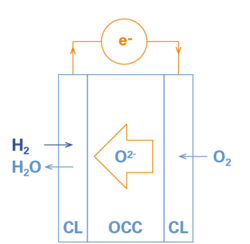Besides the well-known and demonstrated option of hydrogen combustion in classic gas turbine engines, significant technological progress in electrochemical conversion systems adds to the dynamic development of hydrogen-based visions for future air transport. The capability of rapid and integrated evaluation of upcoming technology concepts is vital in order to provide clear guidance for further research and development.

Researchers of Bauhaus Luftfahrt have now performed an initial technical assessment of a synergistic combination of fuel cell and gas turbine technology first introduced in the Bauhaus Luftfahrt Yearbook in 2020. The proposed hybrid concept uses the water mass flow produced by a hydrogen fuel cell in order to improve the efficiency, power output, and NOx emission characteristics of the gas turbine engine through burner steam injection.
In an integrated design study for a future short-/medium-range aircraft application based on liquid hydrogen fuel, the latest fuel cell technology options successfully tested on a laboratory scale were combined with advanced gas turbine technology. For an optimum design case based on solid oxide fuel cell technology, block fuel savings of approximately 7 % were found. The optimum design features a total power share of 43 % for the fuel cell, translating to a water-to-air ratio of 6 % in the gas turbine and yielding around 60 % reduced NOx emissions during cruise. With such emission reduction potentials initially identified, more detailed analyses of this promising hybrid system are clearly motivated.


